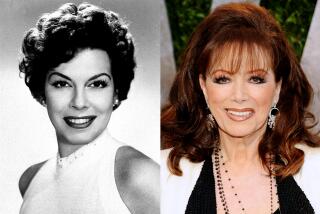Heymann’s Latest Unauthorized Bio Target? A Woman Named Liz
WASHINGTON — C. David Heymann, author of the No. 1 best seller, “A Woman Named Jackie,” has selected his next target--”probably,” the writer says, “the other best-known woman in America”: Elizabeth Taylor.
While Jackie Onassis shunned Heymann, the biographer said that Taylor might cooperate. She hasn’t given him a no yet, he said, adding: “Discussions will continue until such point as I have something to show on paper, in terms of a draft of the book. And then I suppose Elizabeth Taylor will make a decision.”
A Taylor spokeswoman denied both points.
First of all, Nina Bertoncini said emphatically, “Mr. Heymann has not been in touch with Miss Taylor or her representatives.”
Furthermore, “she will not be participating.”
Not the First
Heymann will not be Taylor’s first unauthorized biographer. In 1981, Kitty Kelley published “Elizabeth Taylor: The Last Star.” But then Heymann wasn’t the first to hit it big with a Jackie bio, either. In 1978, the very same Kitty Kelley scored with “Jackie Oh!”
If the similarities continue, Heymann will spend the early ‘90s researching and writing a tome on Frank Sinatra--the topic of Kelley’s latest celebrity bio.
“Maybe. Who knows, in four years?” Heymann mused last week. He was joking, he insisted, and speculated that he would “try an entirely different genre. I always wanted to write fiction.”
According to the Miami Herald, which has done the most thorough investigation of “A Woman Named Jackie,” Heymann may already have indulged his creative impulse a bit.
The newspaper wrote that “some authors (of books in this field) say they doubt Heymann ever spoke to some of the people he says he interviewed. Several people quoted in the book say their words were taken out of context or simply changed to suit Heymann’s purpose.” Critics have noted that some of the key sources--Truman Capote, Peter Lawford, Langdon Marvin Jr.--are dead.
Heymann, whose book about dime-store heiress Barbara Hutton was recalled and pulped by Random House in 1984 because of a serious error, defended his work to the Herald. He reportedly concluded the conversation by refusing to answer more questions and hanging up.
More to Read
Sign up for our Book Club newsletter
Get the latest news, events and more from the Los Angeles Times Book Club, and help us get L.A. reading and talking.
You may occasionally receive promotional content from the Los Angeles Times.








